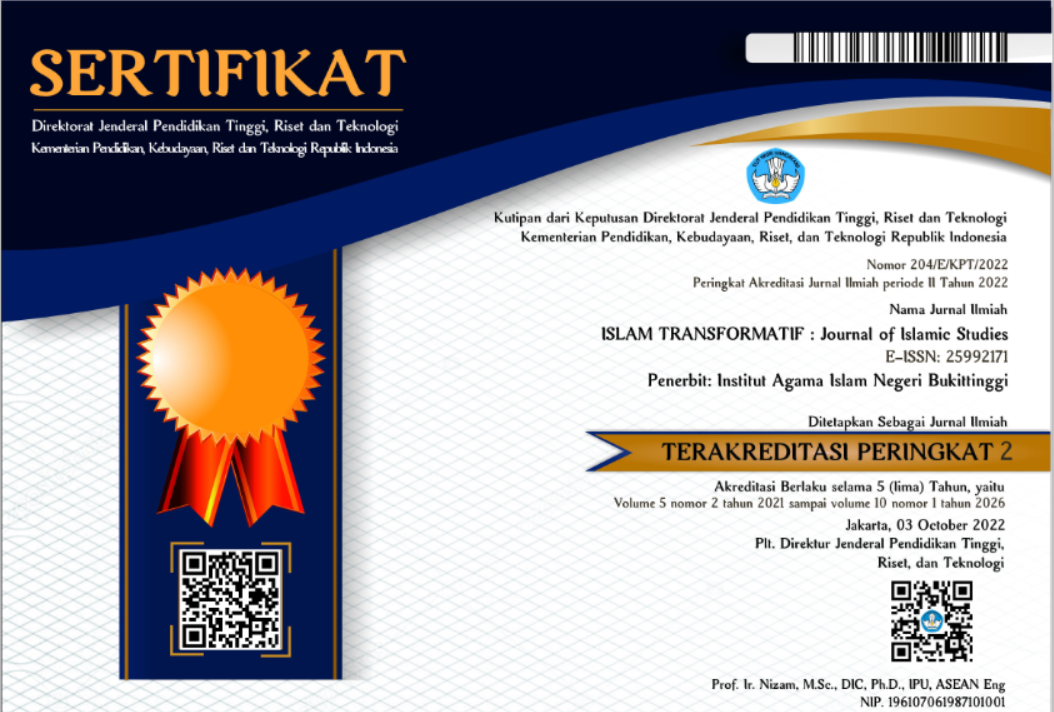VERNAKULARISASI PEMAHAMAN HADIS (Refleksi Wacana Islam Nusantara)
DOI:
https://doi.org/10.30983/it.v2i2.759Abstract
References
Bukhariy, Abu ‘Abdillah Muhammad bin Ismail al- Sahih al-Bukhari, Indonesia: Maktabah Dahlan, t.th.
Gazali, Muhammad al- 1993, “al-Sunnah al-Nabawiyyah Bain Ahl al-Fiqh wa Ahl al-Hadis†terjemahan Muhammad al-Baqir dengan judul Studi Kritis atas Hadis Nabi Saw. Bandung: Mizan.
Hanbal, Abu ‘Abdillah Ahmad bin, 1978, Musnad Ahmad bin Hanbal, Beirut: al-Maktabat al-Islami.
Hasan Riffat-Fatimah Mernissi, 2000, Setara Dihadapan Allah: Relasi Laki-Laki dan Perempuan dalam Tradisi Islam Pasca Patriarkhi. Terjemahan Team LSPPA, LSPPA-Yayasan Prakarsa: Yokyakarta.
Ismail, M. Syuhudi, 1988, ,Kaedah Kesahihan Sanad Hadis: Telaah dan Tintauan Kritis dengan Pendekatan Ilmu Sejarah, Jakarta: Bulan Bintang.
¬¬¬________________ 1994, Hadis Nabi Yang Tekstual dan Kontekstual: Telaah Ma’ani al-Hadis tentang Ajaran Islam yang Universal, Temporal dan Lokal, Jakarta: Bulan Bintang.
Muhibbin, 1996, Hadis-Hadis Politik, Yogyakarta: Pustaka Pelajar.
Qardawi,Yusuf al- 1995, “al-Khasa al-‘Ammah li al-Islm†terjemahan Rofi Munawwar dan Tajuddin dengan judul Karakteristik Islam; Kajian Analitik, Surabaya: Risalah Gusti.
Shihab, Muhammad Quraish, dalam Muhammad al-Gazali, 1993, “al-Sunnah al-Nabawiyyah Bayn Ahl al-Fiqh wa Ahl al-Hadisâ€, diterjemahkan ke dalam bahasa Indonesia oleh Muhammad al-Baqir dengan judul Studi Kritis Atas Hadis Nabi Antara Pemahaman Tekstual dan Kontekstual, Bandung: Mizan.
Downloads
Published
How to Cite
Issue
Section
Citation Check
License
Authors who publish with this journal agree to the following terms:
- Authors retain copyright and grant the journal right of first publication with the work simultaneously licensed under a Creative Commons Attribution-ShareAlike 4.0 International License that allows others to share the work with an acknowledgment of the work's authorship and initial publication in this journal.
- Authors are able to enter into separate, additional contractual arrangements for the non-exclusive distribution of the journal's published version of the work (e.g., post it to an institutional repository or publish it in a book), with an acknowledgment of its initial publication in this journal.
- Authors are permitted and encouraged to post their work online (e.g., in institutional repositories or on their website) prior to and during the submission process, as it can lead to productive exchanges, as well as earlier and greater citation of published work (See The Effect of Open Access).




